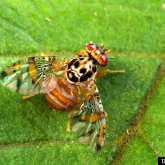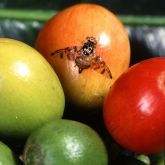Mediterranean fruit fly
Alert
Have you seen Mediterranean fruit fly?
Be on the lookout and report it.
Mediterranean fruit fly is present in Western Australia and occasionally in South Australia.
Movement restrictions are in place to prevent Mediterranean fruit fly from being introduced into Queensland.
Under Queensland legislation if you suspect the presence of Mediterranean fruit fly, you must report it to Biosecurity Queensland on 13 25 23 or contact the Exotic Plant Pest Hotline on 1800 084 881.
Early detection and reporting are key elements in controlling Mediterranean fruit fly.

Adult Mediterranean fruit fly
© Scott Bauer, USDA Agricultural Research Service, Bugwood.org

Adult Mediterranean fruit fly
© Scott Bauer, USDA Agricultural Research Service, Bugwood.org

Mediterranean fruit fly caught in a fruit fly trap
© Peggy Greb, USDA Agricultural Research Service, Bugwood.org

Mediterranean fruit fly larvae
© Mourad Louadfel, Homemade, Bugwood.org

Mediterranean fruit fly (left) are distinctive in appearance, and differ from Queensland fruit fly (right), which has plainer colouring and clear wings
© Scott Bauer, USDA Agricultural Research Service, Bugwood.org and DAF
Mediterranean fruit fly is one of the world's most destructive agricultural pests. It can infest over 200 types of fruit and vegetables and is particularly damaging to stone fruit (such as apricots, peaches and nectarines), pome fruit (such as apples and pears), citrus and guava.
Scientific name
Other names
- Medfly
Description
Adults
- About 3–5mm long (slightly smaller than a housefly).
- Thorax (back) is mottled with shiny and dull black and yellowish-white areas.
- Abdomen (the rear body section) is yellowish to brown with 2 pale cross bands.
- Wings are patterned with yellow, brown and black spots and bands.
Eggs
- White to yellowish-white, long elliptical - like a sickle, and approximately 1–2mm long.
Larvae
- Similar to other fruit flies, the maggots are typically white and up to 9mm long.
Pupae
- Small brown cylinders about 4mm in length.
Plant stage and plant parts affected
- Fruit and vegetables.
Plant damage
As with other fruit fly species, females 'sting' the fruit when they lay their eggs inside. Larvae hatch from eggs and tunnel into the fruit and considerable damage can occur inside the flesh before obvious signs can be seen on the outside of the fruit.
Fruit decaying bacteria are also deposited within the fruit during the egg laying process. These bacteria also contribute to fruit damage.
May be confused with
Adult Mediterranean fruit fly are distinctive in appearance and strongly differ from Queensland fruit fly, which has plainer colouring and clear wings.
Distribution
Widespread in Africa and the Mediterranean region, South and Central America, and present in Hawaii.
In Australia, Mediterranean fruit fly is restricted to Western Australia. Occasional outbreaks occur in South Australia. Movement restrictions are in place to prevent its spread.
Hosts
Mediterranean fruit fly can infest over 200 types of fruit and vegetables.
A list of Mediterranean fruit fly carriers (hosts) is found in Schedule 6 of the Biosecurity Regulation 2016.
Life cycle
- Adult female flies lay their eggs just under the skin of fruit and also deposit fruit decaying bacteria.
- Within 1–2 days, eggs hatch into larvae (maggots) that feed on the fruit.
- When fully developed, maggots drop to the ground to pupate in the soil and transform into the adult fly.
- The new adult flies emerge from the ground.
- After mating, a female fly can lay up to 700–800 eggs during her lifespan.
- Depending on a variety of factors, including the climate, the complete life cycle of a Mediterranean fruit fly can be completed in 2–4 weeks and flies may live for up to 3 months.
Impacts
In 2020–21, the gross value of production of Queensland horticulture crops (excluding cut flowers, nursery and turf) was $2.9 billion (Queensland AgTrends).
A Mediterranean fruit fly outbreak could be devastating to fruit and vegetable industries, causing severe disruption to horticultural market access and trade. Production losses and the use of chemical treatments would also have adverse economic impacts on affected growers, horticultural industries and the communities that rely upon them.
Home gardeners would also be affected and suffer fruit and vegetable losses due to Mediterranean fruit fly infestation.
How it is spread
Spread could occur by illegal transport of host plants that are bearing fruit, or in infested fruit and vegetables.
Monitoring and action
If you detect Mediterranean fruit fly or maggots in fruit and vegetables from interstate, report it immediately to Biosecurity Queensland on 13 25 23.
Prevention
Protect your farm from plant pests and diseases:
Legal requirements
Mediterranean fruit fly is prohibited matter under the Biosecurity Act 2014.
Report suspected Mediterranean fruit fly to Biosecurity Queensland immediately on 13 25 23 or contact the Exotic Plant Pest Hotline on 1800 084 881.
If you think you have found Mediterranean fruit fly, you must take all reasonable and practical steps under your control to minimise any associated risks. This is called a general biosecurity obligation (GBO).
Mediterranean fruit fly carriers must not enter Queensland unless sourced from a state or part of a state that is certified free from Mediterranean fruit fly. Carriers that do not meet these requirements must meet requirements outlined in the Queensland biosecurity manual (PDF, 1.8MB) and have a biosecurity certificate.
Check for restrictions when moving plant material, soil and related equipment in Queensland.
Your cooperation will help protect Queensland from Mediterranean fruit fly.
If you are unsure about movement restrictions, contact the Customer Service Centre 13 25 23.
Further information
- Read the Exotic Pest Identification & Surveillance Guide for Tropical Horticulture for specific advice on how to monitor for exotic plant pests and diseases.
- Find out about Fruit fly identification Australia.
- Find out how to obtain a biosecurity certificate.
- Learn about your general biosecurity obligation (GBO).